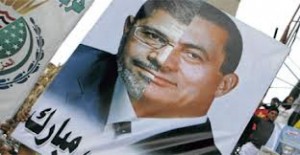 In January 2011, Egyptians surprised themselves with a united show of people power that overwhelmed the tired state-security apparatus surrounding president Hosni Mubarak.
In January 2011, Egyptians surprised themselves with a united show of people power that overwhelmed the tired state-security apparatus surrounding president Hosni Mubarak.
The regime didn’t go down without a fight – nearly 1000 people were shot dead in the streets by snipers lurking inside the shadowy interior ministry building near Tahrir Square on the bloodiest day of the uprising – but the speed with which it collapsed stunned most.
Then, as now, the military chiefs sniffed the wind and decided to intervene, ordering Mubarak to stand aside.
After more than a year running the country by committee, the military finally decided to give democracy a chance.
Not that Egyptians wholeheartedly embraced their first chance to vote in a genuine presidential election.
Only 25 million people in a country of 84 million bothered to turn out at the polls, with just over half voting for Mohamed Mursi, the Muslim Brotherhood candidate, against Ahmed Shafik, a long-time member of Mubarak’s inner circle.
It’s true that Mursi faced a horrible situation when he was sworn in to office.
Foreign investors had deserted the country, as had millions of tourists, the lifeblood of the economy that employs one in every 10 people.
It’s also true that he was never accepted by the mostly secular institutional elites in the military, in business in the public sector, who despise the Muslim Brotherhood and its working class base.
Yet Mursi also proved hopelessly ineffective as a political leader. He never really tried to appeal beyond his base.
It’s telling that despite the professed piety of the Muslim Brotherhood and of Mursi himself, he was never able to unite Egypt’s religious establishment behind him, either.
When he tried to ram through a constitution in November that would have greatly increased his own powers, and set the country on a far more Islamist course than people bargained for, he sowed the seeds for his downfall.
After only 12 months, the urban middle class that dominates Egypt’s two largest cities, Cairo and Alexandria, decided that they had tried democracy and they didn’t really like the taste all that much.
The mass demonstrations of last Sunday were all the military leaders needed to justify another intervention, although the figure of 30 million people being tossed about by protest organisers is impossible to believe.
Mursi was out and what comes next will be decided later.
There is no timetable for new elections, and it’s patently clear that, for now at least, new interim President Adly Mansour is a figurehead who will do exactly what the military tells him to do.
And, thanks to the bloodshed on Friday, and the threats from more extreme elements of the Muslim Brotherhood, there will no doubt be many who fear some kind of terrorism campaign.
Using such a pretext will surely be used to justify a campaign to round up the troublemakers, throw them in jail and restore law and order.
It sounds a lot like the beginning of a search for the kind of leader that Mubarak was back in 1981, when he took the reins of power after Anwar Sadat was assassinated by Islamic extremists and imposed state-of-emergency laws that lasted for 30 years.
By: Jason Koutsoukis
SMH

Leave a Reply
You must be logged in to post a comment.